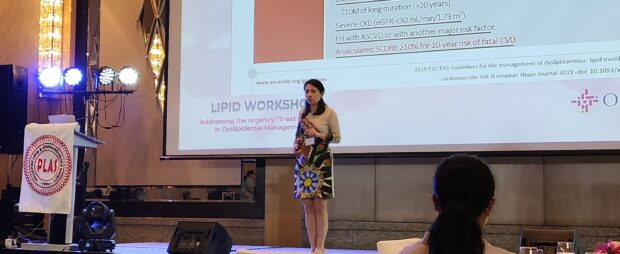Organon in partnership with PLAS conducts workshop on new strategies to address Dyslipidemia
Cholesterol management has become a widespread issue in the Philippines. And as years pass by, high cholesterol levels have been detected in Filipinos as young as the age of 20. The 8th National Nutrition Survey reported that almost half of Filipinos who are 20 years old and above have borderline high cholesterol, indicating that one in every two Filipinos may have it without even realizing it. Specifically, 46.9% of this population has this health condition.
To bring this progressing healthcare issue to light, global healthcare company Organon in partnership with Philippine Lipid and Atherosclerosis Society (PLAS), conducted the Lipid Workshop: Addressing the Urgency “Treat to Goal” in Dyslipidemia. Healthcare professionals from across the country attended a workshop where the benefits of using ezetimibe in combination with statin-based therapy were identified and demonstrated. This approach was shown to be effective in reducing LDL-C (low-density lipoprotein-cholesterol) levels among both high and very high-risk patients, as well as those with dyslipidemia.
Growing risk of high cholesterol in Filipinos
The impact of this problem is starkly evident in the country’s mortality statistics. Based on the 2022 report by the Philippines Statistics Authority, ischaemic heart disease was the leading cause of death among both men and women in the country. What’s alarming is that younger Filipinos are now being diagnosed with heart disease due to unhealthy lifestyle choices. This is attributed to poor dietary habits such as consuming foods that are high in saturated fats, trans fats, and easily digestible carbohydrates.
The trend of bad cholesterol management in the country worsened when the coronavirus pandemic broke out last March 2020. According to cardiologist and PLAS President Dr. Lourdes Ella G. Santos, most people overlooked cardiovascular risk factors during the lockdown.
“Coming off the pandemic, we know that a lot of cardiovascular risk factors were neglected, such as cholesterol management, hypertension, smoking, and obesity. They watched TV and binged on processed food that may not necessarily be healthy,” says Dr. Santos. “So it is expected that dyslipidemia (high bad cholesterol or high triglycerides) may increase in the next few years as people come back from the pandemic. And based on our local prevalence studies, we found that we have increasing bad cholesterol (ldl-c) and low good cholesterol (hdl-c) as a nation. Those two aren’t really a great partnership for heart attacks and strokes.”

Human heart with blocked arteries. 3d illustration
Dyslipidemia is a common condition characterized by abnormal levels of lipids in the bloodstream, including high levels of LDL-C, triglycerides, and low levels of HDL-C (high-density lipoprotein- cholesterol). It is a major risk factor for cardiovascular disease, which is the leading cause of death worldwide. That’s why professionals stand by a simple motto when it comes to LDL-C level management—the lower, the better.
The power of single-pill combinations
Even a small absolute reduction in LDL-C leads to a reduction in the risk of major cardiovascular (CV) events. For every one millimole reduction in LDL-C, the incidence of a CV event goes down by 23 percent. These benefits apply to both statin and non-statin treatments, which are both common treatments for reducing LDL-C levels.
To lower LDL-C levels in very high-risk populations such as the Philippines, a single-pill combination of Ezetimibe added to Statin-Based Therapy is being advocated by healthcare professionals to introduce this treatment into their practice. The benefits of single-pill combinations (spc) for high and very high-risk patients are the following:
- decreasing pill burden and treatment complexity contribute to improvement in treatment exposure.
- provide a strategic approach that allows the intensification of treatment while preserving adherence. In large observational studies, SPCs of ezetimibe/statin were associated with significantly higher odds of high adherence (adherence >75%) than free associations.
- compared with free associations, SPCs have been shown to increase LDL-c target attainment and percentage of patients meeting LDL-C goal.
“What’s great about the single-pill combination therapies really is the fact that you are blocking different pathways at the same time. With one pill, you get a bigger reduction of LDL cholesterol. As opposed to maximizing one drug, when you partner two drugs together in a single pill, you achieve that big reduction in LDL-cholesterol, minimizing the side effects through just one therapy,” explains Dr. Santos. “Locally, Filipinos feel the lesser medications they take, the less sick they are. So if you have a patient on a single-pill combination therapy that is getting him to the goal with a greater reduction in LDL cholesterol, then overall, that patient will be more loyal to that single-pill combination therapy than three or four drugs he’s trying to juggle.”
Dr. Santos also points out the benefit of healthcare practitioners nationwide keeping themselves up to date with therapies such as the single-pill combination, which is now becoming a standard of therapy first line. “We want everyone to be comfortable with using single combination therapies even as first line lipid-lowering therapy options.” says Dr. Santos. “As we talked about yesterday, and today, when you have patients that are classified as very high risk, with a 10-year risk of developing a stroke or heart attack that is high, then the recommendation now is to start these patients on single-pill combination therapy off the bat.”
Our country’s current cardiovascular health needs improvement. But with medical practitioners trying innovative therapies such as ezetimibe added to statin-based therapy, it can lead to a new path of cardiovascular health for Filipinos.
ADVT.

